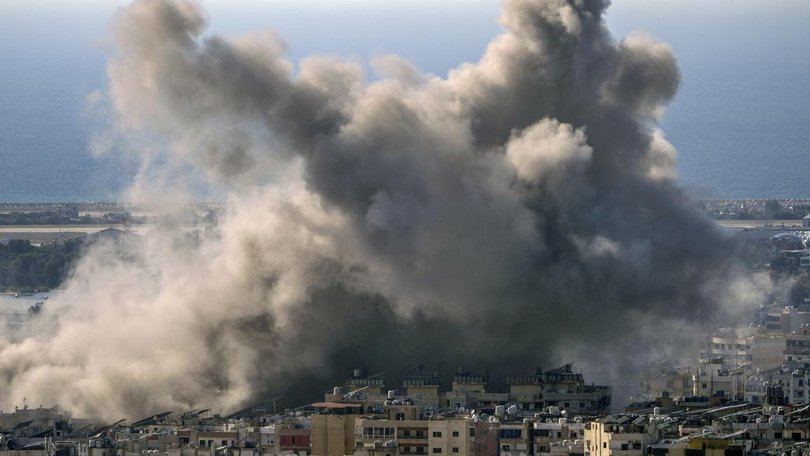Israeli war planes hit Beirut as defence rules out ceasefire until state reaches goal, Hezbollah strikes back
Israeli warplanes have hit the Dahiyeh area of southern Beirut while missiles launched from Lebanon killed two people in northern Israel, police say.

The Israeli military has pounded Beirut’s southern suburbs with air strikes, mounting one of its heaviest daytime attacks yet on the Hezbollah-controlled area after the defence minister ruled out a ceasefire until Israeli goals were met.
Smoke billowed over Beirut as about a dozen strikes hit the southern suburbs from mid-morning.
After posting warnings to civilians on social media, the Israeli military said it had struck Hezbollah targets in the Dahiyeh area of southern Beirut, including command centres and weapons production sites.
Sign up to The Nightly's newsletters.
Get the first look at the digital newspaper, curated daily stories and breaking headlines delivered to your inbox.
By continuing you agree to our Terms and Privacy Policy.It said it had taken steps to reduce harm to civilians and repeated its standing accusation that Hezbollah deliberately embeds itself into civilian areas to use residents as human shields, a charge Hezbollah rejects.
In northern Israel, two people were killed in the city of Nahariya when a residential building was hit by a missile, Israeli police said.
Israelis were forced to take shelter across the north as attack drones were launched from Lebanon, the military said.
One hit the yard of a kindergarten in a Haifa suburb, where the children had been rushed into a shelter, rescue workers said.
None were hurt.
An Israeli strike back across the border killed five people in the Lebanese village of Baalchmay southeast of Beirut, and five more were killed in a strike on the town of Tefahta in the south, Lebanon’s health ministry said.
Another person was killed in a strike in Hermel in the northeast, it said.
Beirut residents have largely fled the southern suburbs since Israel began bombing it in September.
Footage of one strike shared on social media showed two missiles slamming into a building of about 10 storeys, demolishing it and sending up clouds of debris.
Ignited by the war in the Gaza Strip, the conflict between Israel and Hezbollah had been rumbling on for a year before Israel went on the offensive in September, pounding wide areas of Lebanon with air strikes and sending troops into the south.
Israel has dealt Hezbollah heavy blows, killing many of its leaders including Hassan Nasrallah, flattening large areas of the southern suburbs, destroying border villages in the south and striking more widely across Lebanon.
Since hostilities erupted a year ago, Israeli attacks have killed at least 3287 people in Lebanon, the majority in the last seven weeks, according to the Lebanese health ministry.
Its figures do not distinguish between civilians and combatants.
Hezbollah attacks have killed about 100 civilians and soldiers in northern Israel, the Israeli-occupied Golan Heights and southern Lebanon over the last year.
Israel’s new defence minister Israel Katz said on Monday there would be no ceasefire in Lebanon until Israel achieves its goals.
“Israel will not agree to any arrangement that does not guarantee Israel’s right to enforce and prevent terrorism on its own, and meet the goals of the war in Lebanon: disarming Hezbollah and its withdrawal beyond the Litani River and returning the residents of the north safely to their homes,” he said.
Israeli Foreign Minister Gideon Saar had said earlier on Monday there had been “a certain progress” in ceasefire talks but the main challenge facing any ceasefire deal would be enforcement.
The Lebanese government, which includes Hezbollah, has repeatedly called for a ceasefire based on the full implementation of a United Nations resolution that ended a war between the group and Israel in 2006.
The resolution calls for the area south of the Litani to be free of all weapons other than those of the Lebanese state.
Lebanon and Israel have accused each other of violating the resolution.
Israel’s offensive has driven more than a million people from their homes in Lebanon, causing a humanitarian crisis.
Hezbollah rocket fire into northern Israel has forced tens of thousands of people to flee the area over the last year.
